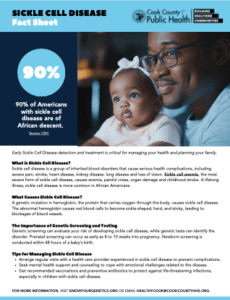Sickle Cell Disease
Sickle cell disease is a group of inherited blood disorders that cause serious health complications. A lifelong illness that’s more common in African Americans, sickle cell disease can cause episodes of severe pain, stroke, heart disease, kidney disease, lung disease, and loss of vision.
Early detection of and treatment for sickle cell disease is critical for managing your health and planning your family.
What Causes Sickle Cell Disease?
People with sickle cell disease have a genetic mutation in hemoglobin, the protein that carries oxygen through the body. Red blood cells normally are flexible enough to move easily through blood vessels. However, in people with sickle cell disease, the abnormal hemoglobin causes red blood cells to become sickle-shaped, hard, and sticky, leading to blockages of blood vessels.
What is Sickle Cell Anemia?
Sickle cell anemia is the most severe form of sickle cell disease. A person with sickle cell anemia has inherited two copies of the abnormal hemoglobin S gene, one from each parent. This results in a high proportion of sickle cells in the blood and causes the most severe symptoms of the disease, including anemia, painful crises, and organ damage. Sickle cell anemia is also a common cause of childhood stroke.
The Importance of Screening
Newborn Screening
Newborn screening is vital to detecting sickle cell disease in the first couple of days of a baby’s birth. During newborn screening, a small quantity of blood is collected from the baby’s heel 24-48 hours after birth. If a newborn has an abnormal sickle cell disease result, the newborn should receive a referral for specialized care. Learn more about newborn screening.
Prenatal Screening:
Healthcare providers can also diagnose sickle cell disease before a baby is born. Testing before birth can be done as early as 8 to 10 weeks into the pregnancy. This testing looks for the sickle cell gene instead of the abnormal hemoglobin. However, this testing cannot tell you how serious the symptoms of sickle cell disease will be.
Blood Tests and Genetic Testing
If you are unsure if you have sickle cell trait or disease, you can get a blood test. Blood tests can determine if your body makes the hemoglobin S protein. Genetic testing can reveal if you have one or two copies of the sickle cell gene. Genetic testing can also help you make decisions about planning your family. Learn more about genetic testing here.
Tips for Managing Sickle Cell Disease
- Arrange regular visits with a health care provider experienced in sickle cell disease to prevent complications.
- Seek mental health support and counseling to cope with emotional challenges related to the disease.
- Get recommended vaccinations and preventive antibiotics to protect against life-threatening infections, especially in children with sickle cell disease.
Fact Sheets
Genetic Screening & Testing
Know your genetics and take charge of your health.
Newborn Screening
Know more and worry less about your baby’s health.
Sickle Cell Disease
Early screening can help manage health.
Updated December 8, 2025, 4:34 PM
